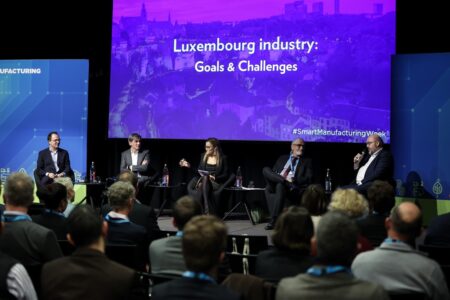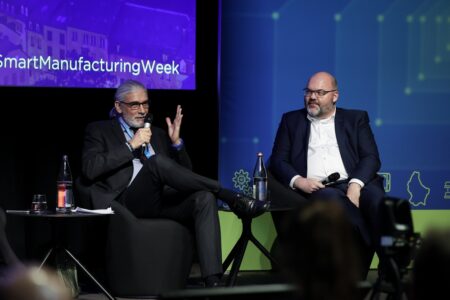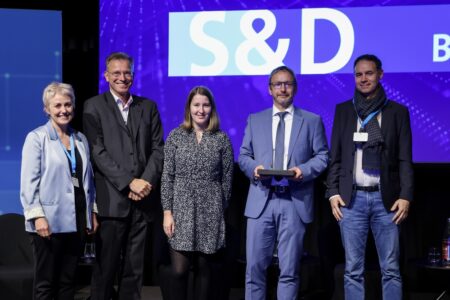 Around one hundred people were present at the Halle des poches à fonte de Belval on Wednesday 17 November for the “phygital” part of the 4th Smart Manufacturing Week.
Around one hundred people were present at the Halle des poches à fonte de Belval on Wednesday 17 November for the “phygital” part of the 4th Smart Manufacturing Week.
In addition to the presentation of the first mapping of companies in the manufacturing ecosystem in Luxembourg, this event was an opportunity to take stock of the issues and challenges facing the sector as expectations change.
“Paul Wurth works with industrial sectors that consume much energy and emit much CO2,” explained Sébastien Wiertz, managing director of Paul Wurth InCub and keynote speaker at this session. “We have to help our customers change their paradigm in order to manage and control this need for energy.”
This requires, first and foremost, measuring the actual energy consumption to spot where unnecessary waste could be reduced. A next step is reducing the consumption further through the implementation of already available energy-saving technologies. After implementing these relatively simple, innovation – possibly carried out by public-private partnerships – could take companies to the next level. “Research-industry cooperation is key if you want to become more sustainable,” he said.
 No pain, no gain
No pain, no gain
And he reminded the audience later, during the panel discussion that followed his presentation, that companies often don’t know where to start when it comes to digitalisation or sustainability. “You have to analyse the pain points in the process and optimise them. People tend to forget that it is precisely these pain points that can bring quick wins.”
During this panel, Marco Walentiny, head of the Directorate General for Industry, New Technologies and Research at the Ministry of the Economy, did not fail to praise the merits of the national law for research, development and innovation, which includes several aid measures that could be used by companies that want to digitise or become more sustainable by using less energy and resources and protecting the environment.
“These projects may concern, for example, production processes, the internal organisation, products or services. One scheme specifically targets SMEs that might not necessarily have all the expertise needed to implement a project in-house. It offers them the opportunity to call on external experts for whom the costs incurred can be covered by state aid.”
The construction sector, in particular, is in great demand for a digital and sustainable approach. This was confirmed by Joël Schons, the owner of the company Stugalux. “Digitalisation is the tool that the construction sector needs to be sustainable. If we are not documenting what we are building and optimising the construction before we build it, we are always creating some legacy problems for the next generation.”
“Making life at work easier for our people ”
This need for digitalisation is increasingly apparent, in all types of business. At Morgan Advanced Materials, a global materials engineering company, for example, processes are still characterised by a good deal of manual operations.
“When Luxinnovation encouraged us to consider a digitalisation process, our first thoughts turned to robots. However, we realised that this was not what we needed, as a robot cannot think like a person or see a defect,” explained Morgan Advanced Materials’ managing director Yannick Malvaux. “So we changed our approach and sought to make the best use possible of the huge amount of data we have that we were not necessarily exploiting, with the sole aim of making the life of our people at work easier. This includes, for example, eliminating the manual and repetitive aspects of our processes.”
 ProdPilot Grand Prix 2021
ProdPilot Grand Prix 2021
At the end of the ceremony, Sasha Baillie, CEO of Luxinnovation, presented the 2021 ProdPilot Grand Prize. This initiative is aimed at companies in the Greater Region that have developed processes that enable them to improve their productivity or implemented innovative measures that have improved the efficiency of their working methods.
Four companies were shortlisted:
- Fenster Mersch (from Luxembourg), which specialises in the production of windows and has developed a holistic optimisation of its project planning;
- MHA Zentgraf (Saarland), a specialist in fluid dynamics, which has developed a process for digitalising quality awareness documentation;
- Belgatrans (Lorraine), active in logistics services and which has created a dedicated platform;
- S&D Blechtechnologie (Rhineland-Palatinate), which has also implemented a holistic solution for its entire sheet metal processing business.
The jury, which included a representative of Luxinnovation, awarded the Grand Prize 2021 to S&D Blechtechnologie.













